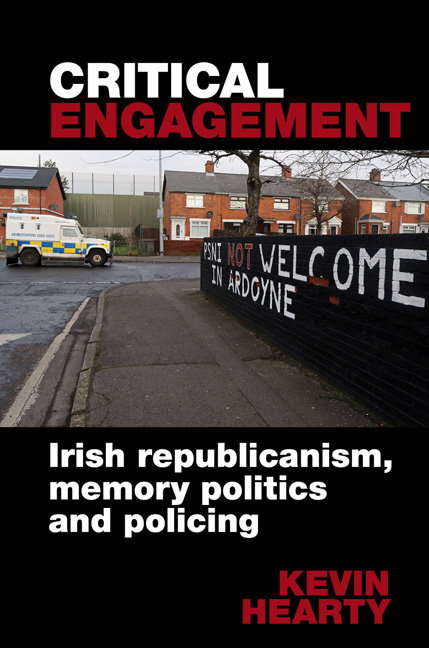Book contents
- Frontmatter
- Contents
- Acknowledgements
- List of Figures and Tables
- List of Abbreviations
- Introduction
- 1 Understanding a Fraught Historical Relationship
- 2 Irish Republican Memory as Counter-Memory
- 3 Ideology and Policing
- 4 The Patriot Dead
- 5 Transition, ‘Never Again’ and ‘Moving On’
- 6 The PSNI and ‘Community Policing’
- 7 The PSNI and ‘Political Policing’
- Conclusion
- References
- Index
Introduction
- Frontmatter
- Contents
- Acknowledgements
- List of Figures and Tables
- List of Abbreviations
- Introduction
- 1 Understanding a Fraught Historical Relationship
- 2 Irish Republican Memory as Counter-Memory
- 3 Ideology and Policing
- 4 The Patriot Dead
- 5 Transition, ‘Never Again’ and ‘Moving On’
- 6 The PSNI and ‘Community Policing’
- 7 The PSNI and ‘Political Policing’
- Conclusion
- References
- Index
Summary
On Sunday 28 January 2007, at a specially convened Extraordinary Ard Fheis (party conference) Sinn Féin, the dominant political voice within modern Irish republicanism, voted in favour of endorsing the Police Service of Northern Ireland (PSNI). The party rank and file backed a leadership proposal to ‘support the PSNI and criminal justice system’ so that ‘a civic policing service, accountable and representative of the community is delivered as quickly as possible’. The motion was carried by a comfortable majority despite some internal disquiet. The Sinn Féin leadership had ‘won’ the debate and avoided the public walk out previously seen at pivotal Ard Fheissana. The move marked a comprehensive redefinition of the relationship between the policing apparatus upholding the Northern Ireland state and Irish republicans with fundamental ideological opposition to that state. Sinn Féin's formal endorsement of policing was notable for both the historical relationship between Irish republicans and policing in the North of Ireland, and for the wider transitional backdrop against which it occurred.
To grasp the magnitude of the move in terms of the former, one must first acknowledge that Irish republicans have traditionally had a fractious relationship with Northern Irish police forces – most notably the Royal Ulster Constabulary (RUC). This was characterised by violent opposition, mutual suspicion and political antagonism. Irish republicans and policing agents in Northern Ireland have been a source of violence, suffering and, on many occasions, death for one another. Given this fraught historical backdrop one may ask how a relationship of ‘critical engagement’ with those long considered the perennial ‘other’ was even possible. To understand ‘critical engagement’ in its proper context, one must not only remain cognisant of this historical relationship but also look beyond it to evaluate the move in accordance with political developments unfolding at the time.
If Sinn Féin endorsement of policing is to be truly understood, it must be necessarily viewed as a component of a choreographed process of political transition rather than an aberration that materialised in an apolitical vacuum. The veracity of this is borne out in the Ard Fheis motion itself, which stated that its implementation would occur ‘only when the power-sharing institutions are established’.
- Type
- Chapter
- Information
- Critical EngagementIrish republicanism, memory politics and policing, pp. 1 - 24Publisher: Liverpool University PressPrint publication year: 2017



